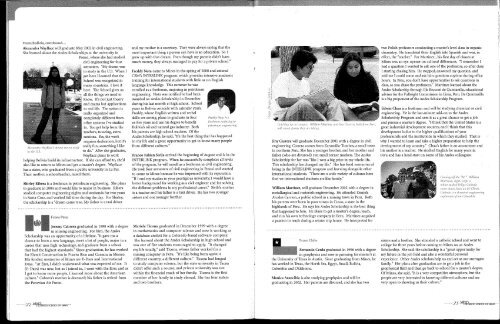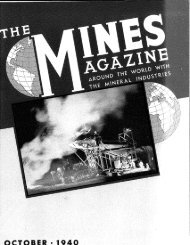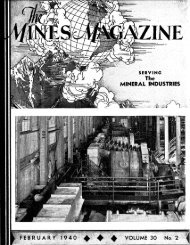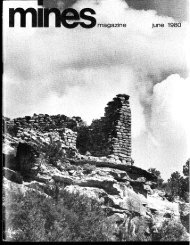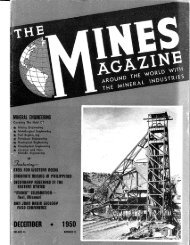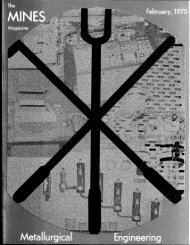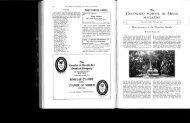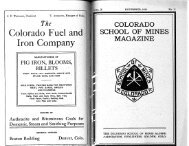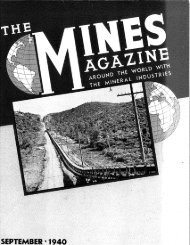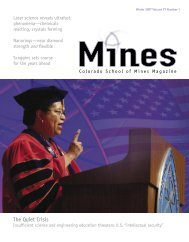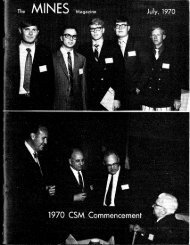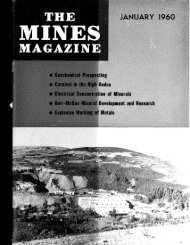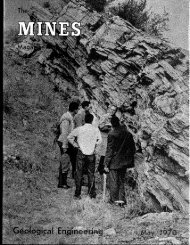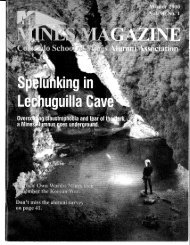Mines Magazine - Colorado School of Mines
Mines Magazine - Colorado School of Mines
Mines Magazine - Colorado School of Mines
Create successful ePaper yourself
Turn your PDF publications into a flip-book with our unique Google optimized e-Paper software.
Alexandra WayUace will graduate May 2002 in civil engineering.<br />
She learned about the Andes Scholarships at the university in<br />
Potosi, where she had studied<br />
civil engineering for four<br />
• semesters. "My dream was<br />
M to study in the U.S. When I<br />
M got here I learned that the<br />
<strong>School</strong> was recognized in<br />
many countries. I love it<br />
here. The <strong>School</strong> gives us<br />
all the things we need to<br />
know. It's not just theory<br />
and exams but applications<br />
to real life. The system is<br />
really organized and<br />
completely different from<br />
other systems I've studied<br />
in. You get help from the<br />
teachers, tutoring, extra<br />
sessions. Yes, the work<br />
requues dedication, but it's<br />
really fun, something I like<br />
Ah'.Ktuulm Wayll'jfc's drenui io sHidy<br />
to do." After she graduates,<br />
ill die U.S.<br />
WayUace plans to work<br />
helping Bolivia build its infrastructure. If she can afford to, she'd<br />
also like to return to <strong>Mines</strong> and get a master's degree. WayUace<br />
has a sister, who graduated from a public university in La Paz.<br />
Their mother, a schoolteacher, raised them.<br />
Shirley Ribera is a freshman in petroleum engineering. She plans<br />
to graduate in 2004 and would like to major in business. Ribera<br />
studied computer engineering nights and weekends for two years<br />
in Santa Cruz, and worked full time during the day. For Shirley,<br />
the scholarship is a "dream come true. My father is a taxi driver<br />
and my mother is a secretary. They were always saying that the<br />
most important thing a person can have is an education. So I<br />
grew up with that dream. Even though my parents didn't have<br />
much money, they always managed to pay for a private school."<br />
Freddy Nota came to <strong>Mines</strong> in the spring <strong>of</strong> 2000 and entered<br />
CSM's INTERLINK program, which provides intensive academic<br />
training for international students with little or no English<br />
language knowledge. This summer he was<br />
enroUed as a freshman, majoring in petroleum<br />
engineering. Nota was notified he had been<br />
awarded an Andes Scholarship in December<br />
during his last month at high school. <strong>School</strong><br />
years in Bolivia coincide with calendar years.<br />
Freddy, whose Engfish written and verbal<br />
skills are strong, plans to graduate in four Freddy Nola is n<br />
or five years and use his degree to benefit<br />
Bolivia's oil and natural gas industry. Both petroleum<br />
his parents are high school teachers. Of the<br />
Andes Scholarship, he said, "It's the best thing that has happened<br />
in my life and a great opportunity to get to Icnow many people<br />
from different cultures."<br />
frediiiiaii iiiajoriiig in<br />
engineering.<br />
Franco Fabian Sivila arrived the beginning <strong>of</strong> August and is in the<br />
INTERLINK program. "When he successfully completes all levels<br />
<strong>of</strong> the program, he will enroll as a freshman in clvU engineering.<br />
He took four semesters <strong>of</strong> civil engineering in Potosi and wanted<br />
to come to <strong>Mines</strong> because he was impressed with its reputation.<br />
"If I end my studies in your prestigious university, I would have a<br />
better background for working as a civil engineer and for solving<br />
the different problems in my pr<strong>of</strong>essional career." Sivila's mother<br />
is a teacher and his father is a taxi driver. He has two younger<br />
sisters and one younger brother<br />
(.iiUcldiig iij) on cainpns, VVilHiini Marlines and Jiiiy O.irrern, liotli fnim ['era,<br />
talk ulioiii classes ihey arc taking,.<br />
Jiny Carrera will graduate December 2001 with a degree in civil<br />
engineering. Carrera comes from Zarumiila-Tumbes, a small town<br />
in northern Peru. She has a younger brother, and her mother and<br />
father (who are divorced) run small corner markets. The Andes<br />
Scholarship for her was "hke I won a big prize in my whole life.<br />
This scholarship has changed my life." She has fond memories <strong>of</strong><br />
being in the INTERLINK program and learning alongside other<br />
international students. "There are a wide variety <strong>of</strong> cultures here<br />
that we international students are like famUy."<br />
WUliam Martinez, will graduate December 2002 with a degree in<br />
metallurgical and materials engineering. He attended Daniels<br />
Alcides Carrion, a pubUc school in a mining town in Peru. Both<br />
his parents were born in poor towns in Cusco, a state in the<br />
highlands <strong>of</strong> Peru. He says his Andes Scholarship is the best thing<br />
that happened to him. He plans to get a master's degree, teach,<br />
and run his own technology company in Peru. Martinez acquired<br />
a passion to teach during a winter trip home. He interpreted for<br />
two PoUsh pr<strong>of</strong>essors conducting a master's level class in organic<br />
chemistry. He translated their English into Spanish and was, in<br />
effect, the "teacher" For Martinez, his first day <strong>of</strong> classes at<br />
<strong>Mines</strong> was an eye-opener on cultural differences. "I remember 1<br />
had a question I wanted to ask one <strong>of</strong> the pr<strong>of</strong>essors, so after class<br />
I starting chasing him. He stopped, answered my question, and<br />
told me I could come and ask him questions anytime during <strong>of</strong>fice<br />
hours. In Peru, you don't have opportunities to ask questions in<br />
dass, so you chase the pr<strong>of</strong>essors." Martinez learned about the<br />
Andes Scholarship through Ilia Rocconi de Quintanilla, educational<br />
adviser for the Fulbright Commission in Lima, Peru. De Quintanilla<br />
is a big proponent <strong>of</strong> the Andes Scholarship Program.<br />
Edwin Chau is a freshman and will be studying chemical or civU<br />
engineering. He is the last-minute add-on to the Andes<br />
Scholarship Program and sees it as a great chance to get a job<br />
and pursue a master's degree. "I think that the United States is a<br />
great industrial development country, and I think that this<br />
development is due to the higher qualifications <strong>of</strong> your<br />
pr<strong>of</strong>essionals and the institutions in which they studied. That is<br />
why I wanted to learn and take a higher preparation to help the<br />
development <strong>of</strong> my country." Chau's father is an accountant and<br />
his mother is a teacher He studied English for many years in<br />
Peru and has a head start on some <strong>of</strong> his Andes colleagues.<br />
(.Aiiningoj'f lite "I'vi." Williurn<br />
Martinez,<br />
rigltl, heijis ii<br />
wiiiiewaedied P'elipe GuUndo<br />
come ilciwn from cm /vf-<br />
Climb.<br />
iPditnh is


